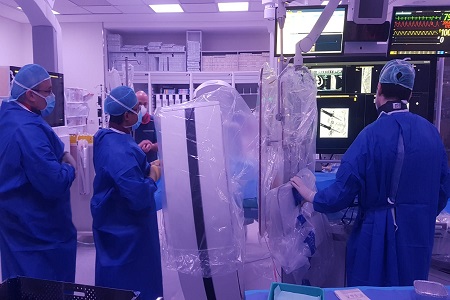
Christmas Eve is always a special time for Mary A, an 86-year-old resident of Bethlehem. Her large Christian family gathers at the family’s charming stone home to experience the colorful traditional processions to the Church of the Nativity. They feast on Mary’s waraq dawali, lemony stuffed grape leaves with mint and cardamom, along with her signature roast chicken with sumac.
Despite the limitations on large gatherings due to the COVID-19 pandemic, Christmas 2020 marked a special celebration for Mary, a personal miracle made possible by Hadassah, and a special donation of equipment by the United States Agency for International Development/American Schools and Hospitals Abroad (USAID/ASHA) program.
Mary is the mother of 10 grown children, four of whom live in the US. Always active in volunteer work in Bethlehem, she recently authored a book on the cultural history of her town. Children frequently come to interview her about local lore.
Every morning for years, she started her day by drinking demitasse coffee in delicate china cups and conversing with other neighborhood women in her garden.
And then, on October 3, she fell in that garden. Her local doctors blamed her fall on a weakness caused by the severe narrowing of her aortic heart valve in combination with advanced osteoporosis. For months, Mary lay in bed, unable to walk, suffering from excruciating back pain. The Bethlehem physician couldn’t locate the cause of her agony.
A family friend who is an anesthesiologist at the Hadassah Medical Organization volunteered to have her x-ray and CT scan looked at by a colleague there. He consulted with Dr. Joshua Schroeder, a senior spine surgeon and head of the Spinal Deformity Unit. Dr. Schroeder identified previously undiagnosed fractures in her thoracic spine as the cause of her horrific pain. Even worse than the pain, Dr. Schroeder explains, was that, at any moment, the fractures could suddenly leave this previously active woman paralyzed for life.
The corrective surgery typically performed to fix the problem was not an option for Mary, who could not tolerate a long procedure under general anesthesia. But thanks to Hadassah’s surgical expertise and the special state-of-the-art Philips Medical Azurion 7 B20/15 biplane image-guided therapy system provided by USAID/ASHA, Dr. Schroeder was able to fix Mary’s problem safely. Dr. Schroeder explains, “The precision of the imaging is such that we can confidently complete surgery that we would never have attempted previously. Even though this older patient has severe osteoporosis, which makes imaging very difficult, we were able to repair her fractures using a local anesthetic and to give her back her life.”
Originally created for the most exacting neurosurgical procedures within the brain, this equipment enables the spine surgeon to view vertebrae from both sides. Working with its digital controls, the surgeon can make precise decisions in real-time. Dr. Schroeder and senior neurosurgeon Prof. Jose Cohen, who presides over Hadassah’s neuro-angiography suite, have expanded the use of the sophisticated equipment beyond the initial vision for it. “Applying technology from one field to another is a Hadassah specialty,” notes Prof. Cohen. “At Hadassah, we simply love to brainstorm and collaborate, going beyond the box to maximize the use of equipment. The result is that we’re the only medical center in the world where such complex spine surgery can take place without general anesthesia, saving lives that would otherwise be stunted by inoperable fractures.”
Mary recalls with a smile, “I didn’t feel anything during the surgery.”
Now Mary has returned home to her family and is enjoying the colors, sounds, and scents of the Christmas holiday, which in her Greek Orthodox community extends through January 7. She has come home to her flower garden, where her giant Christmas cactus is blooming with red flowers. With just the assistance of a walker, Mary can get around, offering visitors traditional date-filled Christmas cookies, together with strong, sweet Bethlehem coffee.
“I am so grateful to all those who enabled me to regain my life and to celebrate this beautiful holiday,” Mary says. “In my name and in the name of my whole family, ‘Shukran.’ That’s Arabic for thank you. I can’t thank you enough.”
Picture caption: First from left Dr. Joshua Schroeder, first from right Prof. Jose Cohen while the surgery, using the Philips Medical Azurion 7 B20/15 biplane image-guided therapy system
